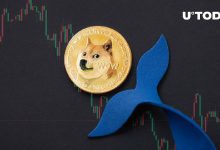66% of Shiba Inu (SHIB) Holders in Losses as Price Fails to Get Momentum

Shiba Inu (SHIB), once hailed as a Dogecoin killer and a potential market disruptor, is facing a significant downturn. Recent data from IntoTheBlock, a prominent crypto analytics firm, reveals a concerning statistic for SHIB enthusiasts: A whopping 66% of its holders are currently in the red, suffering losses due to the token’s inability to gain momentum in the current market conditions.
This grim scenario unfolds as only a mere 28% of SHIB investors find themselves on the profitable side of the ledger, with the remaining 6% breaking even, neither gaining nor losing. What is more alarming is the concentration of wealth within the SHIB ecosystem, where 78% of the total holdings are controlled by a small group of large investors, indicating a high level of wealth concentration that poses additional risks and volatility to average investors.
Bearish sentiment prevails
As of the latest figures, SHIB is trading at an underwhelming $0.000009039, marking a 0.78% decrease in the last 24 hours and a 5.86% slump over the past month. This lackluster performance is mirrored in its trading volume, which has also seen a decline of 10.03%, now standing at $62.28 million. The decrease in trading volume is indicative of waning interest and investor caution, as market participants reassess their positions in a token that struggles to find its footing.
The current market dynamics of Shiba Inu reflect the inherent volatility of meme coins and the broader cryptocurrency ecosystem. The concentration of holdings among large investors, combined with the majority of holders being in a loss, paints a complex picture of SHIB’s market stability and investor sentiment.
Looking forward, the key factors that could influence SHIB’s price and holder dynamics include changes in market sentiment, prominent developments and the broader economic environment affecting investment flows into speculative assets. Additionally, any new initiatives or partnerships that enhance SHIB’s utility or adoption could positively impact investor perception and market valuation.




 Bitcoin
Bitcoin  Ethereum
Ethereum  Tether
Tether  Dogecoin
Dogecoin  USDC
USDC  Cardano
Cardano  TRON
TRON  Chainlink
Chainlink  Stellar
Stellar  Hedera
Hedera  Bitcoin Cash
Bitcoin Cash  LEO Token
LEO Token  Litecoin
Litecoin  Cronos
Cronos  Ethereum Classic
Ethereum Classic  Monero
Monero  Dai
Dai  Algorand
Algorand  OKB
OKB  Cosmos Hub
Cosmos Hub  Stacks
Stacks  Theta Network
Theta Network  Gate
Gate  Maker
Maker  KuCoin
KuCoin  Tezos
Tezos  IOTA
IOTA  NEO
NEO  Zcash
Zcash  Polygon
Polygon  Synthetix Network
Synthetix Network  Tether Gold
Tether Gold  TrueUSD
TrueUSD  Dash
Dash  Holo
Holo  Zilliqa
Zilliqa  Enjin Coin
Enjin Coin  0x Protocol
0x Protocol  Siacoin
Siacoin  Basic Attention
Basic Attention  Qtum
Qtum  Ravencoin
Ravencoin  Bitcoin Gold
Bitcoin Gold  Decred
Decred  NEM
NEM  Ontology
Ontology  DigiByte
DigiByte  Nano
Nano  Status
Status  Hive
Hive  Huobi
Huobi  Waves
Waves  Lisk
Lisk  Steem
Steem  Numeraire
Numeraire  Pax Dollar
Pax Dollar  BUSD
BUSD  OMG Network
OMG Network  Ren
Ren  Bitcoin Diamond
Bitcoin Diamond  Bytom
Bytom